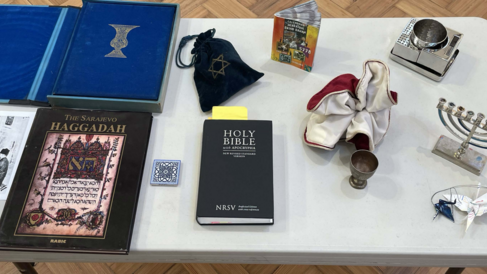
On March 25, 2023, the Cambridge Interfaith Programme hosted ‘Objects across religious boundaries: An interactive storytelling workshop’ at Downing Place United Reformed Church. The event was part of the third Cambridge Festival. Organisers Dr Anastasia Badder and Dr Safet HadžiMuhamedović report:
Our aim was to think about the ways all kinds of material things act in and across religious lives. Inspired by theorists like Bruno Latour, Gilles Deleuze, and the material turn in the anthropology of religion, we wanted to take objects as the protagonists in stories of encounter.
Five researchers were scheduled to tell stories: Susie Triffitt and Hina Khalid (both PhD students in the Faculty of Divinity), Vanessa Paloma-Elbaz (from the Faculty of Music), and workshop co-organisers Safet HadžiMuhamedović and Anastasia Badder (both anthropologists, with strong links to the Cambridge Interfaith Programme). Alongside these University of Cambridge researchers, we also invited workshop attendees to bring their own objects and share their stories.
Sharing objects and stories
Speakers and attendees shared deeply meaningful and fascinating objects. Safet shared a facsimile copy of the Sarajevo Haggadah* and connected its story to the elegant and well-preserved mid-century British haggadah found on the sidewalk in London. Hina told a story about a tile collected during a trip to Andalusia. Vanessa told a story about four sacred things and the senses, followed by a song that, as she explained, is typically sung by Moroccan Jewish families in the moments between ritual hand washing and eating. Susie recounted the moving history of two beautifully folded cranes shared between mother and daughter.
Workshop attendees welcomed the invitation to share object-shaped stories. For example, one brought tefillin** preserved and passed down by his father after fleeing Austria in the 1930s. These stories were powerful and often deeply personal, speaking to relations across families, faiths, time, and distance, shared rituals, ambiguity, and mixture, and the complex tangles of things, peoples, and histories traversing speakers’ lives.
What did we learn?
As we shared and discussed, we noticed how things often resist easy categorization. Even objects that appeared straightforward or to be linked to a single history or religious group were, on closer inspection, revealed to be implicated in multiplex and polysemous identities, narratives, pasts, and trajectories. Another recurring theme was how things could become bound up in, and/or facilitate, many different kinds of relation as they moved through time and space.
By coincidence, several stories revolved around or involved haggadot in some way. This sparked an idea to organize a discussion or other storytelling event related to the tales and lives of haggadot for the upcoming holiday of Passover. Perhaps this is a topic to return to at the 2024 Cambridge Festival?
* Haggadah is the Hebrew name given to texts that shape how the Exodus story is retold at the dining table during the Jewish festival of Passover (Pesach in Hebrew). The word translates as ‘telling’. Gifted between generations, these documents are typically decorated with colourful illustration. Haggadot is the plural form of haggadah.
** Tefillin are small boxes containing extracts from the Jewish scriptures. These are tied to the head and arm during prayers, using leather straps.
